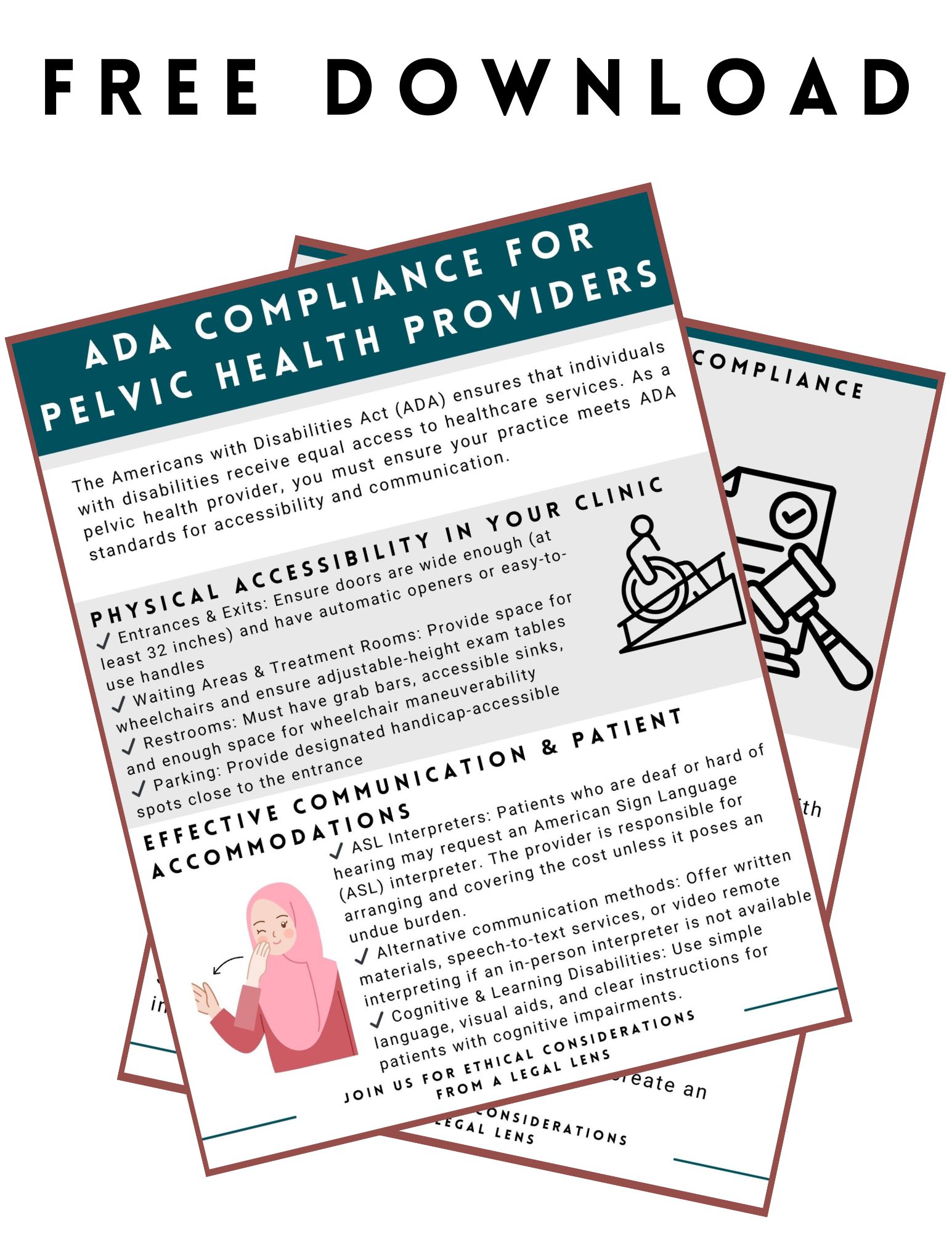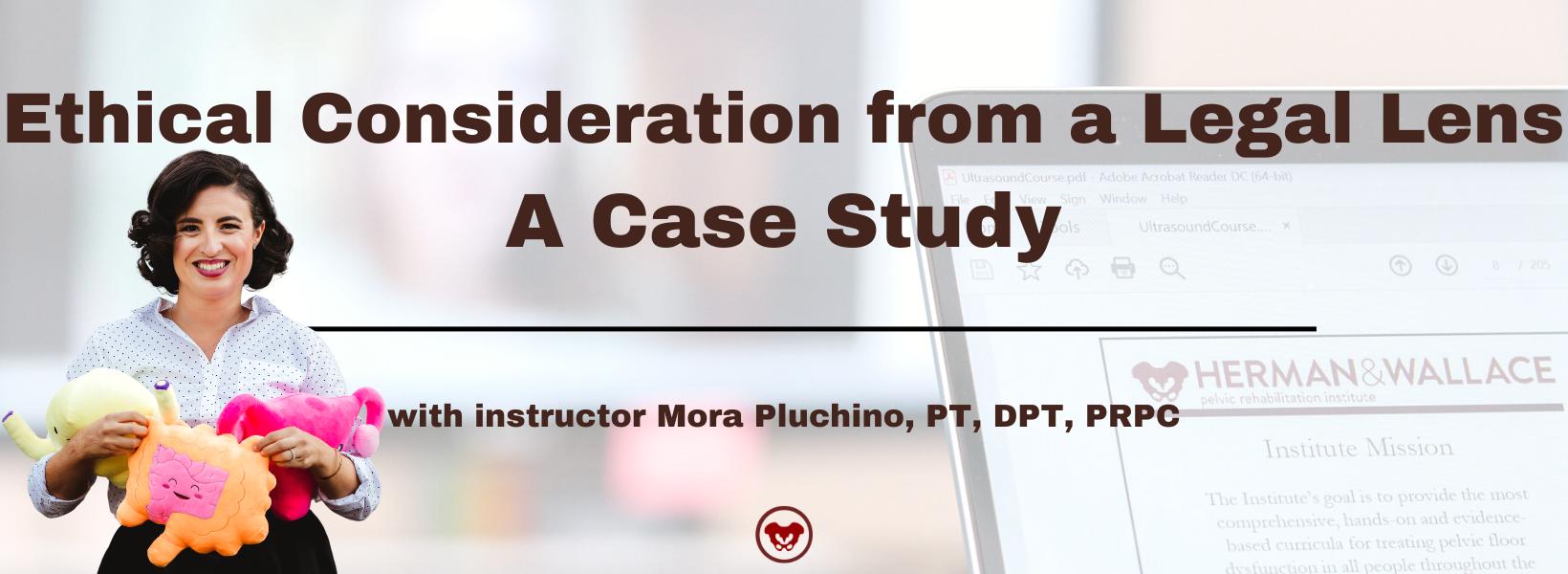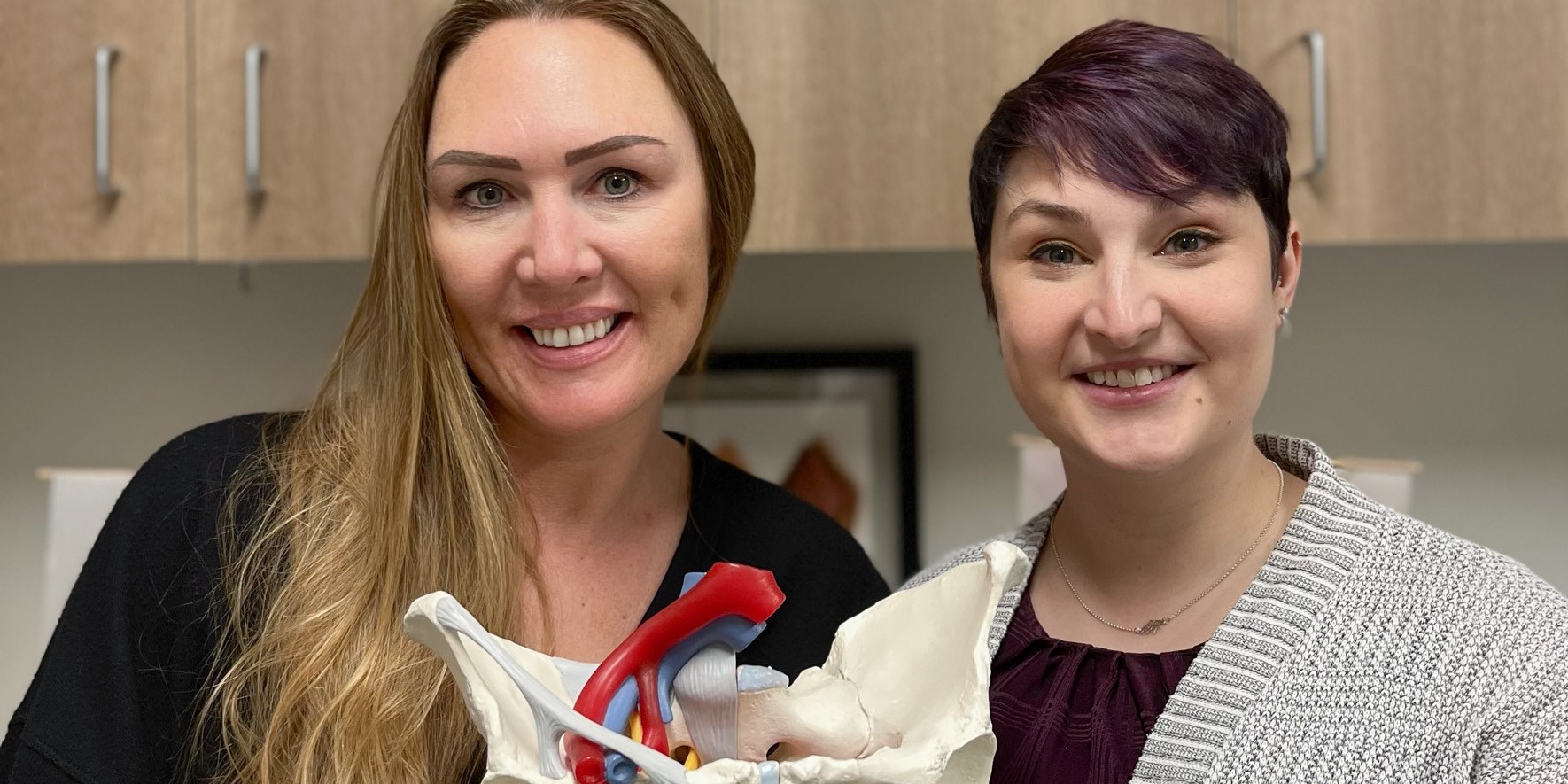
Dearest Gentle Readers,
It has come to this author’s most refined attention that a most curious scandal has fluttered through the drawing rooms - or rather, the online salons - of the pelvic health world. The whispers suggest that the reputable purveyor Intimate Rose has, perhaps, been reappropriating patients from their dear therapist partners by embarking upon a bold new venture: the offering of telehealth services.
One can scarcely imagine a more titillating topic among those who prize propriety and pelvic alignment in equal measure. And thus, in the spirit of intellectual inquiry, I present to you an ethical analysis of this latest society stir: Intimate Rose versus Pelvic Floor Therapists.

The tale begins, as many modern dramas do, on that most notorious of forums, Facebook. A well-respected instructor from the esteemed Herman & Wallace Institute, shared an innocent observation in a popular support group. Having ordered a pelvic wand for a patient, they received an automated invitation for that very patient to engage in virtual pelvic floor services.
Some found the offer thoughtful, even gallant - particularly in cases where patient-provider gender mismatch posed a barrier. Yet others clutched their pearls, aghast at what they perceived as a potential overreach. Within moments, the comments swelled to a chorus exceeding fifty voices - some indignant, some indifferent, and a few serenely supportive.
It was, as they say, a scandal with excellent posture.

According to Dr. Nancy Kirsch’s tome, Ethics in Physical Therapy (2024), the first step in any ethical inquiry is to identify the realm, whether individual, institutional, or societal.
In this case, dear readers, we find traces of all three. The individual therapist wrestles with feelings of betrayal or relief. Society at large may applaud increased access to care. Yet the heart of the controversy lies within the organizational realm, a perceived discord between Intimate Rose’s business decisions and the expectations of the Pelvic Health Community.
And oh, how quickly those expectations can sour when business and benevolence entwine too tightly.

Our therapists, like the heroes and heroines of any great moral tale, passed through all five ethical stages:
- Moral Sensitivity - the uneasy flutter of “something feels off.”
- Moral Judgment - the pondering of right versus wrong.
- Moral Motivation - the desire to do something about it.
- Moral Courage - the bravery to actually say something.
- Moral Potency - the strength to act and endure the fallout.
And indeed, act they did some commented publicly, others whispered privately, and a few renounced Intimate Rose altogether. There were letters, posts, and even podcasts. One might call it a veritable Regency Riot - via Wi-Fi.

Is this a case of right versus wrong, or merely a duel between two virtues?
While some would label it misconduct, others, including your humble author, see instead a true ethical dilemma: a choice between two acceptable, yet conflicting courses of action.
After all, dear reader, there is honor in both sides:
- Intimate Rose seeks to extend access to care.
- Therapists seek to protect their patient relationships.
A moral quandary worthy of the finest London drawing rooms.

Lady Whistledown, ever thorough, has examined the ten criteria of ethical clarity. A sampling follows:
- Context & Character – For a decade, Intimate Rose has graced our community with generosity: free starter kits, global donations, educational outreach, and over $2 million in support of pelvic health causes. Their affiliate program offers modest rewards for both patients and therapists, while free YouTube resources, blogs, and training sessions abound. Truly, their consistent kindness and commitment to patient care hardly bespeak the manners of a villainous schemer.
- The Players – On one side, Intimate Rose; on the other, pelvic health providers (some insurance-based, some cash-based). Those in private practice perhaps felt their clients might be wooed away. Yet, survey results revealed none of Intimate Rose’s telehealth patients were taken from other therapists.
- Consequences – Might the company lose favor among providers? Might patients feel conflicted? Certainly. But evidence shows telehealth outcomes rival in-person care (Razak Ozdincler et al., 2025; Lin et al., 2025).
- Laws & Obligations – As long as state telehealth regulations are observed, no impropriety exists. Transparency, after all, was maintained through pre-launch communications.
- Professional Guidance – The APTA and AOTA themselves embrace telehealth as a means to widen access.
- Legal Test – The only real trespass may be slander; those hasty tongues wagging falsehoods (NYC Bar Association, 2025).
- The Stench Test – Does it smell off? To some, yes. Betrayal has a distinct bouquet. Yet virtue ethics (beneficence, non-maleficence, justice, autonomy, veracity, fidelity) all appear intact (Kirsch, 2024).
- Front-Page Test – “Company Expands Access to Pelvic Care” inspires far less uproar than “Company Steals Patients.” Scandal, it seems, is in the phrasing.
- Mom Test – One’s mother might simply say, “If you’re as good as you claim, my dear, your patients shall stay.”
- Professional Test – Many seasoned mentors would call this not theft, but savvy business strategy. After all, other beloved practitioners in our field have followed the same “educate, nurture, offer” model to great acclaim.
Cultivating an audience before offering products is, in truth, a well-established business practice. So why the uproar among pelvic health providers? Perhaps it is the struggle to embrace an abundance mindset over one of scarcity. Similar scenarios elsewhere drew little ire, yet here, it seems, the matter strikes far too close to home.

This author, ever impartial, concludes that we face not malice, but misunderstanding. A dilemma indeed - where both sides act in good faith yet find themselves at odds.
Three approaches offer resolution:
- Rules-Based: No rule was broken; thus, no penalty applies.
- Ends-Based: The greater good, increasing patient access, outweighs commercial discomfort. Pelvic health providers no longer using Intimate Rose due to a misunderstanding is harmful to the company. However, Intimate Rose offering telehealth services to patients who do not have access to a local in person therapist, are home bound, or prefer telehealth due to fear or history of trauma is definitely a larger provider of “good.”
- Care-Based: Healing the relationship through communication and transparency serves all parties best.
No one, dear reader, is automatically swept into telehealth services. A customer who purchases a tool may merely receive a polite missive or text noting the existence of such offerings, or an invitation to learn more. These post-purchase courtesies may, upon request, be removed for those using a provider’s code. Patients may yet glimpse the occasional update or newsletter, but any suspicion of client re-appropriation may now be, quite elegantly, laid to rest.
Harmony, it seems, can be restored with a touch of dialogue and decorum.

Let this serve, dear readers, as a reminder that in matters of both ethics and enterprise, the path to virtue lies not in outrage, but in understanding.
When next you feel that unmistakable whiff of impropriety, pause before unsheathing your quill (or opening your comment thread). Reflect, inquire, and consult your moral compass - for therein lies the difference between righteous indignation and mere gossip.
After all, preserving one’s reputation and one’s reason is the finest posture of all.

P.S. Should this tantalizing ethical quandary have piqued your curiosity, one may further indulge one’s moral refinement by attending Ethical Concerns for Pelvic Health Professionals scheduled for November 23, 2025 where we will learn how to journey through the landscape of moral quandaries together.
References:
- Kirsch, N. R. (2024). Professional issues and ethics in physical therapy: A case-based approach (2nd ed.). McGraw Hill.
- Lin, K. Y., Chen, C. Y., Wu, P. C., Huang, M. H., Ou, Y. C., Kao, Y. L., & Lin, K. H. (2025). The feasibility and effects of a telehealth-delivered physical therapy program for postmenopausal women with urinary incontinence: A pilot mixed-methods study. Maturitas, 197, 108376. https://doi.org/10.1016/j.maturitas.2025.108376

What do you know about the Americans with Disabilities Act (ADA)? You may be thinking that you are a pelvic health provider, so you don’t need to worry about laws, rules, and regulations. You may need to know more about the ADA than you thought.
Scenario: Your patient calls and requests an American Sign Language interpreter during their pelvic health evaluation. You don’t know much about this. You start to research online, and here is what you find…
Google search answer: “Yes, under the Americans with Disabilities Act (ADA), if your practice is a place of public accommodation (e.g., a healthcare provider), you are generally required to provide effective communication, which may include an ASL interpreter when necessary. However, the law considers "undue burden," meaning if the cost is too high relative to your resources, alternative accommodations (like written communication or remote video interpreting) may be acceptable. You cannot charge the patient for the interpreter.”
You do more research and find out the Americans with Disabilities Act (ADA) is a landmark civil rights law enacted in 1990 that prohibits discrimination against individuals with disabilities in various aspects of public life. It ensures that people with disabilities have the same rights and opportunities as everyone else, covering areas such as employment, public accommodations, transportation, government services, and telecommunications.
Under the ADA, as a pelvic health provider, you will have to provide public accommodations. You may work for a location or be a private business owner, but in either setting, you’ll have to be able to make accommodations. This means being ready to cover physical accessibility (ramps, elevators, bathrooms) and accommodations for people with visual, hearing, or other impairments.
How does this relate to ethics?
Consider the scenario above. You find out that in-person ASL interpreters charge $60 - 90/hour, have a two-hour minimum, and also include paid travel. This means that each visit will cost you between $130 and $250 for just the interpreter. Virtual visits are $1.99 - $2.99 per minute, and the company tells you most deaf people prefer in-person when given the option. The companies you talk to explain that not all deaf people can even use a virtual interpreter. The cancellation windows vary from 48 business hours to 5 business days. You now know that based on the ADA, you have to provide this if you take on this patient, AND you have to pay for this service. What do you do?
An ethical dilemma is the choice between two “right” options. There isn’t a straightforward right versus wrong as there is with an ethical problem. This puts more pressure on the therapist or manager (if the therapist is in a larger organization) to make a judgment call.
The decision you make will likely be based on a few different factors. These are the questions that come to mind for making a decision on this ethical dilemma.
- What is my practice model - fee for service or insurance based?
- How much will I be reimbursed for the therapy session?
- Will this session take more time than other sessions?
- What is my profit margin like?
- Do I have the financial cushion to take on a patient that may actually have my practice losing money?
- How long will the patient need to be seen?
- Is there anyone else in the community I can refer this patient to who may have better resources to accommodate this patient?
- Is the interpreter going to be HIPPA compliant?
- Is the patient going to be comfortable with the interpreter in the room?
- Am I confident the patient will attend appointments regularly?
What would you do as a provider?
I can tell you what our clinic did when this happened. When this patient called, we told them we’d need to take a moment to do some research to find out if we were able to accommodate them. We did our research and were able to find a friend of a friend who was qualified but had better rates than the bigger agencies. We looked at what we HAD to provide and compared that to what we COULD provide, and we decided to take on this patient. Financially, the visit would “net zero,” meaning we wouldn’t make any money, but we also wouldn’t lose money if the patient attended regularly. We felt our clinic was best able to accommodate this patient of the providers in the area. We weighed the pros for the clinic vs. the cons and did the same for the patient and made our decision. That is what we must do every day as a providers. Choosing to refer the patient to an equally qualified location that could accommodate the patient might also have been a good choice.
For pelvic health practitioners, understanding the ADA is crucial when working with individuals who may have disabilities. Some key considerations include:
- Ensuring clinic accessibility (ramps, door widths, exam tables) for individuals with mobility challenges
- Providing communication accommodations for those with speech, hearing, or cognitive impairments
- Offering reasonable modifications to treatment plans for patients with disabilities
- Knowing how legal protections apply when treating patients and ensuring compliance in documentation and practice policies
Ethical dilemmas don’t come with easy answers. That’s why ongoing education is critical for pelvic health providers. Understanding both the ethical and legal implications of our work ensures that we protect our patients, our licenses, and our professional integrity.
That’s why ongoing education is critical for pelvic health providers. Understanding both the ethical and legal implications of our work ensures that we protect our patients, our licenses, and our professional integrity.
For those looking to deepen their knowledge in this area, the Ethical Considerations from a Legal Lens course is a must-attend event. Taking place remotely on April 12, 2025, this course is designed to provide pelvic health practitioners with the tools they need to navigate real-world ethical challenges with confidence.
What You’ll Gain from the Course
- A deeper understanding of legal considerations in pelvic health practice
- Strategies to navigate informed consent and patient autonomy
- Insights into trauma-informed care and how to approach sensitive patient cases
- Tools to manage professional boundaries and ethical decision-making
- Interactive discussions and case studies to help apply concepts in real scenarios
As providers, we want to deliver the best care possible while ensuring that our practice remains ethical, respectful, and legally sound. Education is the key to making that happen. If you’re ready to strengthen your ethical knowledge and enhance your practice, sign up for the Ethical Considerations from a Legal Lens course today!
Freebie:
ADA Compliance for Pelvic Health Providers - Free Download Reference
AUTHOR BIO
Mora Pluchino, PT, DPT, PRPC
 Mora Pluchino, PT, DPT, PRPC (she/her) is a graduate of Stockton University with a BS in Biology (2007) and a Doctorate of Physical Therapy (2009). She has experience in a variety of areas and settings, working with children and adults, including orthopedics, bracing, neuromuscular issues, vestibular issues, and robotics training. She began treating Pelvic Health patients in 2016 and now has experience treating pelvises and ages with a variety of Pelvic Health dysfunctions. There is not much she has not treated since beginning this journey, and she is always happy to further her education to better help her patients meet their goals.
Mora Pluchino, PT, DPT, PRPC (she/her) is a graduate of Stockton University with a BS in Biology (2007) and a Doctorate of Physical Therapy (2009). She has experience in a variety of areas and settings, working with children and adults, including orthopedics, bracing, neuromuscular issues, vestibular issues, and robotics training. She began treating Pelvic Health patients in 2016 and now has experience treating pelvises and ages with a variety of Pelvic Health dysfunctions. There is not much she has not treated since beginning this journey, and she is always happy to further her education to better help her patients meet their goals.
Dr. Pluchino strives to help all of her patients return to a quality of life and activity that they are happy with for the best bladder, bowel, and sexual functioning they are capable of at present. In 2020, she opened her own practice called Practically Perfect Physical Therapy to help meet the needs of more clients. She has been a guest lecturer for Rutgers University's Blackwood Campus and Stockton University for their Pediatric and Pelvic Floor modules since 2016. She has also been a TA with Herman & Wallace since 2020 and has over 150 hours of lab instruction experience. Mora has also authored and instructs several courses for the Institute.

Rehabilitation providers experience ethical conflicts every day, whether they realize it or not. Just today, I was cruising through social media on my lunch break and saw a post (edited for autonomy) that posed an ethical concern, potentially without its author even knowing. We’ll refer back to this post throughout the blog so please read:
“We have a patient at my clinic whose partner called and scheduled the appointment for the patient. My colleague did the evaluation this morning and said the partner answered all questions for the patient. The partner was inquiring about decreasing posterior pelvic floor tension for anal sex. The therapist found it strange that the partner was answering all the questions for the patient. At this time, I'm really wondering if the partner is forcing the patient to come to pelvic floor therapy and participate. How would you all handle this situation?”
You know this stopped my scroll immediately. Yes, it is a patient care question. However, this situation also brings up so many other intricacies that we encounter as pelvic health providers. I gave my reply and then read others, and this experience made me glad that Herman and Wallace offered three ethics classes talking about ethics for pelvic floor therapists to attend and be able to collaborate on issues just like the one above.
There are many ways that people like to work through ethical situations and scenarios and the ethics series with H&W usually uses the RIPS model, but just to add some new perspective, today we are going to look at the above scenario through the lens of The Critical Dialogue Method.
Delaney et al. (2024) state “Clinical ethicists bring moral reasoning to bear on concrete and complex clinical ethical problems by undertaking ethical deliberation in collaboration with others.” Their article dives into 7 steps of facilitation of such discussions among clinicians. This model is intended to help clinicians identify issues, clarify, and guide them as needed. It also acknowledges that not all ethical problem-solving is linear, chronological, or top-down.
Step One is “setting the scene.”
This is known as an opening statement. This alerts a provider’s peers about the details of the inquiry and allows those participating to be fully present to give their input. As therapists like to do, we should be working to create a safe space for the provider with the questions. In the scenario above, that post was step one as it set the scene for what the therapist had concerns about.
Step two is “listening actively and without interruption.”
This is where therapists get to put all of their experience in being active listeners with patients to the test. Keep in mind these steps don’t need to be linear so listening and replying with questions that show a person was actively listening is important. In our example, we’ve all joined a social media location to collaborate and share clinical questions, thus tacitly agreeing to be active listeners.
Step three is “gathering information and perspectives.”
This is when those active listening skills come in. When it's a social media post, this might be the comments section or even DMs! In our scenario above, therapists were great at sympathizing, empathizing, clarifying, and giving their perspective. They said things like “I’m seeing the red flags you are” and “I’ve had that happen to me and here is what happened…” Someone even kindly took the partner’s side asking if maybe they were a medical provider and that was an explanation for the potentially problematic controlling behavior. Here are some examples of statements or questions that showed a therapist was actively listening.
- What I heard you say is….
- The way you described it, what seems to have happened is…
- I’m hearing that there is some (insert emotion here - confusion, uncertainty, apprehension)....
- Can you tell us more about….
- Can you explain what you meant when you said…
(Adapted from Delaney et al., 2024)
Step four entails "closing in on the ethical question(s).”
This helps move the situation from what has been ethically feeling problematic to what can be done to resolve the issue. In this scenario, I think we can think of a few ethical questions. Some that come to mind are below:
- Is a partner allowed to make their spouse attend a therapy session potentially against their will?
- Is a spouse entitled to privacy with only their therapist if they would like this?
- Is a therapist able to intervene if they suspect abuse is occurring?
- If abuse is suspected, what next steps should be taken?
Step five is about “identifying ways of responding.”
This allows the conversation to move from “What is wrong” to “How do we resolve this?” The first part of this is exploring all of the “possible and available courses of action (Delany et al., 2024).” In this case, we’re thinking about what options are on the table, and what is reasonable while also considering the “what ifs” and things that have already been tried. In our scenario, a variety of solutions were provided to the questioning clinicians.
- Separate the couple in order to let the patient speak about their needs without pressure from the spouse.
- Provide privacy with a closed door and noise machine.
- Address the patient’s goals, reviewing them privately with the patient’s permission, to ensure they align with what their partner may have said previously.
- Check in with the patient’s referring provider to see if they have any concerns about abuse.
Step six involves “identifying and weighing the ethical pros and cons of each possible response.”
In our above scenario, we have a variety of potential pros and cons. We could offend, embarrass, or potentially lose a client by making a false allegation. We could deny a shy, anxious, or scared patient their emotional support human. We could be robbing a partner who feels guilt or worry over possibly causing their partner pain the ability to help correct it. We could also be helping a patient leave an abusive relationship or avoid having to perform an activity they don’t want to. We could be preventing domestic violence or any type of abuse. There is a spectrum, and we can create many scenarios along the way.
Step seven, the last step, is “ethically justified outcomes.”
This means that all of the previous steps have been completed (not necessarily sequentially or singularly) and then an ethically appropriate action is selected. As the RIPS model teaches us, there are many different situations and so some ethical scenarios will be very simple with just one answer, while others may be a dilemma being two potentially right answers, while others may be a whole lot of “it depends” and “I’m not sure!” In our case above, the consensus was that we definitely needed more information in order to make an informed decision on the next course of action!
If you were intrigued by taking a clinical question like this and trying to come up with a “good” solution, you may enjoy taking Ethical Concerns for Pelvic Health Professionals to sharpen, or just use, your ethical and clinical decision-making skills! The next course event is scheduled for January 19th, 2025.
Reference:
- Delany C, Feldman S, Kameniar B, et al. Critical dialogue method of ethics consultation: making clinical ethics facilitation visible and accessible. Journal of Medical Ethics. Published Online First: 08 July 2024. doi: 10.1136/jme-2024-109927 https://jme.bmj.com/content/early/2024/10/24/jme-2024-109927

If you saw Ethical Considerations for Pediatric Pelvic Health and thought “Why are they making ANOTHER ethics class?” please let me take a moment to explain its origin and purpose in the Herman and Wallace course offerings. I wrote my Pediatric Pelvic Floor Play Skills course when I had colleagues asking for ways to play with their patients. When I started teaching this class, some of the most common questions that came up seemed like ETHICAL questions. How do we handle pediatric care in different settings? How do we get consent from minors? If a child says no but their legal guardian wants the assessment done, what does the provider do?
Pediatric Pelvic Floor Play Skills is a class written to help providers take the pelvic health knowledge they have, and learn activities they can perform with different ages of children to help work on their pelvic floor function. One of the tricky parts of working with children is including the child in their care plan and coordinating with caregivers. In this course, talk about specific concerns and considerations by age, as well as strategies to bring to a provider's practice. This class is for the provider who does not have a lot of experience treating pediatric patients and wants to learn how to make sessions enjoyable and effective. While in Ethical Considerations for Pediatric Pelvic Health, we review the different overall milestones, as well as what age-appropriate expressions of sexuality may look like as children develop toward adulthood.
Let's talk about Pediatric Care
When we say “pediatric” this can span from infants to teenage age groups. Dealing with a crying baby will be different decision-making versus a toddler in a tantrum or a defiant teen. The pediatric population is a vulnerable group because they can’t advocate for themselves, their own interests, and their health to protect themselves from harm. When we consider decision-making with a child, a therapist should consider things like their development, family structure, competence, and education levels. Children develop in a variety of areas including their fine and gross motor skills, language, cognitive, social, emotional, and behavior.
In pediatric care, obtaining informed consent has two parts because it requires therapists to secure consent from caregivers and to seek assent from the child. Once they have obtained the parent’s permission, therapists should explain the procedures, potential benefits, and risks in an age-appropriate manner to the child. Therapists have to make sure the child feels comfortable and involved in their care at each step.
Pelvic health providers should establish clear guidelines about what information will be shared with caregivers and what will remain confidential when working with children, especially tweens and teens. This helps the therapist to build trust with the patient and encourages open communication with the patient. We must also consider what the caregivers are entitled to hear about their child’s life and medical care. For example, if a tween wants to talk to you about sex, do you feel equipped with the ethical implications for yourself in your practice? What about if a child discloses a sexual assault at school? What about if a teenager tells you they are pregnant but hasn’t told their parents? This class will give some guidelines to make these decisions and provide a peer “think tank” to further discuss.
One of the easiest ways to be an effective pediatric provider includes communication with the patient and their support system. Make sure to review topics like the condition, treatment options, and expected outcomes to empower them to make informed decisions. Keep your communication clear and provide educational materials that are accessible and understandable. Make sure to check with caregivers about what words and pictures they are comfortable with the child seeing and hearing. Some children or caregivers may have personal, religious, or cultural implications that may limit what education they want the child to be exposed to.
Every child is unique, and their treatment should reflect their individual needs, preferences, and circumstances. Therapists should listen to the child and their support network, and incorporate their feedback into the plan of care. Consider their life and routine to make sure their care and homework fit into their daily schedule. Advocating for the needs and rights of pediatric patients is a critical aspect of ethical care. Therapists may need to recommend resources, treatments, and accommodations, and promote awareness and education about pediatric pelvic health issues within the broader community. This may include coordinating with a child’s daycare, school, or other medical providers.
What course is right for you?
- Ethical Considerations for Pediatric Pelvic Health on October 13th - Learn more about the ethical challenges pediatric pelvic health practitioners may experience including consent, managing situations of trauma and abuse, and managing autonomy for minors. If you work with pediatric patients on a regular basis, this class can be an additional step in your practice. It will review topics like consent, abuse, education, communication, and diagnoses that tend to have more ethical considerations with pediatric patients. Join us to review background information and then discuss, as a group, different cases and ethical situations to help further your pediatric clinical practice.
- Pediatric Pelvic Floor Play Skills on October 20th - This is a beginner-level course and is a good fit for providers who do not have a lot of experience treating pediatric patients and want to learn how to make sessions enjoyable and effective. In this course, we discuss specific concerns and considerations by age, strategies to bring to a provider's practice, sample home programs, equipment purchase lists (with a budget in mind), tips for helping get families on board with the implementation of care, and resources such as outcomes measures, developmental milestone checklists, and recommendations things parents ask for like how to talk about periods and sex.
AUTHOR BIO:
Mora Pluchino, PT, DPT, PRPC
 I am a graduate of Stockton University with my BS in Biology (2007) and Doctorate of Physical Therapy (2009). I have experience in a variety of areas and settings, working with children and adults, including orthopedics, bracing, neuromuscular issues, vestibular issues, and robotics training. I began treating Pelvic Health patients in 2016 and now have experience treating women, men, and children with a variety of Pelvic Health dysfunction. There is not much I have not treated since beginning this journey and I am always happy to further my education to better help my patients meet their goals.
I am a graduate of Stockton University with my BS in Biology (2007) and Doctorate of Physical Therapy (2009). I have experience in a variety of areas and settings, working with children and adults, including orthopedics, bracing, neuromuscular issues, vestibular issues, and robotics training. I began treating Pelvic Health patients in 2016 and now have experience treating women, men, and children with a variety of Pelvic Health dysfunction. There is not much I have not treated since beginning this journey and I am always happy to further my education to better help my patients meet their goals.
I strive to help all of my patients return to a quality of life and activity that they are happy with for the best bladder, bowel, and sexual functioning they are capable of at the present time. In 2020, I opened my own practice called Practically Perfect Physical Therapy Consulting to help meet the needs of more clients. I have been a guest lecturer for Rutgers University Blackwood Campus and Stockton University for their Pediatric and Pelvic Floor modules since 2016. I have also been a TA with Herman and Wallace since 2020 and have over 150 hours of lab instruction experience.

Mora Pluchino is instructing her ethics course, Ethical Considerations from a Legal Lens, which is scheduled for June 3, 2023. This remote course covers ethical considerations from a legal lens for professionals working in the area of Pelvic Health. Health Care Professionals have many day-to-day ethical considerations to “do no harm” including basic decisions for billing, patient care, safety, and compliance. Pelvic Rehabilitation comes with additional layers of vulnerability and ethical challenges, and the legalities of pelvic health can add further complications for patient care, business, and clinical practice decisions.
The patient is a 70 cis-gender female:
- Primary complaints - Painful sitting, terrible tailbone pain x 2 years
- Secondary complaints - SUI, fecal urgency, mild POP
- Prior therapy - multiple, most recent Hospital Based OPPT 3 x per week x 8 weeks (24 visits)
- Progress - minimal to none, the patient actually thinks her symptoms are worsening, pain is unbearable
- Other diagnoses - Parkinson’s Disease, HTN, high cholesterol
- Primary Insurance - Medicare
SEPTEMBER
The patient presents to the provider for specialized pelvic floor therapy. The patient is seen 1 x per week for a total of 6 visits. The patient reports a 75% reduction in symptoms, adheres to her HEP, and attends all scheduled visits.
Treatment Included:
- Internal rectal musculature work (Instructed in Pelvic Floor Level 2A)
- Body mechanics and coccyx mobilization - internal and external (Instructed in Coccydynia & Painful Sitting)
- Sacral nerve release techniques (Instructed in Sacral Nerve Manual Assessment and Treatment)
NOVEMBER
The patient is now able to participate in her ADL, regular exercise routine, and her social life and she has noticed how her endurance and balance have declined as she tries to return to normal. She starts to come in 2 x per week, one day a week focusing on her pelvic floor complaints and one day a week focusing on her endurance, balance, and Parkinson’s symptoms. She completes an additional round of therapy 2x per week for 8 weeks. She progresses slowly but objectively measures small therapy gains.
Additional treatment:
- General strength and endurance training and conditioning
- Large amplitude movement program
- Education for a home walking program
- Connection to a Parkinson’s boxing program in the community
FEBRUARY
The patient gets sick, misses 2 weeks of therapy, and has a return in her coccyx pain and an exacerbation of her Parkinson’s symptoms. Her tremors became so bad that she has to cancel multiple sessions at the last minute. She is now also having swallowing and speech problems. She finally gets in with her neurologist who explains her Parkinson’s has progressed. They recommend changing her medications, assessment for a brain stimulator, and trying an intensive LSVT BIG Program 4x per week for 4 weeks.
Please pause and take a moment to think about a few things that may pop up for a provider from an ethical or legal lens!
SOME ETHICAL + LEGAL CONSIDERATIONS FOR THE CASE
- Prior to beginning the LSVT BIG program, the patient is already at 46 visits in total
- Your practice is a small, niche market practice that specializes in Pelvic Health - this patient only ended up with you due to her tailbone pain - your location is small and does not have “big gym” equipment or space
- You do have two providers that have prior LSVT BIG training
- This patient has worked with and reports feeling safe and comfortable with both providers
- Sitting in the car for more than 45 minutes is again a challenge for the patient and you are the closest qualified provider to her home
- You are the only Pelvic Floor clinic within the 15-mile radius
- To accommodate this patient’s scheduling needs will make your waitlist longer for others
- Medicare has an annual cap for services which changes based on practice setting. Physical therapy and Speech therapy share this cap.
- This patient has been plateauing/ possibly worsening as her Parkinson’s progresses and sessions are feeling like maintenance therapy.
- There are hospital-based LSVT BIG programs 55 minutes away from the patient's home.
The fun and challenging part about ethics is that the possibilities and scenarios are many and ever-changing. This is a real live case and an example of what therapists have to navigate on a day-to-day basis. Sadly, there is no right or wrong. Ethics and Law are areas of more gray than black and white.
Ethical Considerations from a Legal Lens has the following goals:
- Define basic Ethical Framework topics
- Perform Core Values Self Assessment
- Identify the components of the RIPS model and the Model Rules of Professional Conduct
- Explore Pelvic Health from a Legal Lens
- Apply the RIPS model to real-life legal scenarios
- Devise a plan of action or solution to legal and ethical scenarios
The hope is that with this understanding of things like beneficence (balance harms and benefits), non-malfeasance (do no harm), justice (fairness), and autonomy (respect for self-determination) as well as being well-versed in patient care topics like consent, abuse, misconduct, discrimination, and our individual practice acts, providers will feel more comfortable in their ethical decision making.
Ethical Considerations from a Legal Lens and Ethical Concerns for the Pelvic Health Professionals both offer the information needed to have these conversations and start problem-solving these decisions. It is encouraged as part of the precourse work to send in the ethical concerns that have you stuck in the clinic or keep you awake at night!
Ethical Considerations from a Legal Lens

Price: $175.00 Experience Level: Beginner Contact Hours: 6 hours
Course Dates: June 3 and November 12
Description: This one-day remote course covers ethical considerations from a legal lens for professionals working in the area of Pelvic Health. In general, Health Care Professionals have many day to day ethical considerations to “do no harm.” This includes basic decisions for billing, patient care, safety and compliance. Pelvic Rehabilitation comes with additional layers of vulnerability and ethical challenges, and the legalities of pelvic health can add in further complications for patient care, business and clinical practice decisions.
Ethical Concerns for the Pelvic Health Professionals

Price: $175.00 Experience Level: Beginner Contact Hours: 6 hours
Course Dates: September 16
Description: This one day remote course covers ethical considerations for professionals working in the area of Pelvic Health. In general, Health Care Professionals have many day to day ethical considerations to “do no harm.” This includes basic decisions for billing, patient care, safety, and compliance. Pelvic Rehabilitation comes with additional layers of vulnerability and ethical challenges due to the anatomical areas being treated, topics being discussed, and intimacy of sessions.

Mora Pluchino, PT, DPT, PRPC (Faculty member, and Sr. TA) is a graduate of Stockton University with a BS in Biology (2007) and a Doctorate of Physical Therapy (2009). Mora authored and instructs Ethical Concerns for Pelvic Health Professionals and Ethical Considerations from a Legal Lens.
When I used to hear the word “ethics requirement,” I would wrinkle my nose and find the cheapest, quickest course to fulfill my New Jersey requirement. I would sit through it and count down the hours. It was not out of a lack of respect for the continuing educator or the importance of the material. I just felt, no matter how the material was presented it was just dry and did not feel like it applied to my more niched areas of practice.
As I dove deeper into pelvic floor treatment and the pelvic floor community, I realized there was such a need for us to have these conversations on the topic of ethics. A lot of questions posted on social media forums and groups have an underlying ethical component and practitioners are not necessarily aware. The more I researched, the more I realized these topics are so complex and can be very interesting when applied to the daily life of a pelvic health provider
Let’s talk about how you can know if something has an ethical component or concern. There are a variety of tests and measures to assess ethical situations and we review these in the class Ethical Concerns for the Pelvic Health Professional. If you are wondering if some of the clinical questions you have are actually founded in ethics you may find yourself asking questions like the following.
One of my favorite ways to assess an ethical question is by using the Kidder’s Ethical Decision Making Model. The fourth step of this model includes four checkpoints that can be helpful for quick clinical questions. These give us an idea of ways to recognize right versus wrong in scenarios and how we can correct or act accordingly. The four tests proposed by kidder are “The Legal Test,” “The Stench Test,” “The Front Page Test” and “The Mom Test” (Ferrier, 2021). If an ethical concern does not pass one of these tests, it does not have merit as an ethical course of action. If something doesn’t pass these tests, the right versus wrong aspect is a moral temptation and a person has to decide which option they would like to choose. We all have different moral compasses and backgrounds and so each person’s comfort level with these decisions may be different.
If a scenario arises, we start with “The Legal Test.” This is where we think about whether an action (or inaction) is legal or not. This may require some research or consultation if we do not know the answers. “The Stench Test” tests a person’s inner moral intuition. How does it feel with how you have been raised and when referenced against your moral foundation? “The Front Page Test” encourages a person to theorize how they would feel if the ethical situation they are thinking about were to be on the front page of a newspaper. It is a publicity test, do you want that to be how the world sees you, your clinic, your practice, your skills, etc? “The Mom Test” makes us reference all those who have been moral examples or might pass judgment on decisions we make (Ferrier, 2021).
Knowing these tests, look at the scenarios at the end of this blog. Imagine how you might run through the four Kidder Tests clinically. This can be great practice for clinical decision making. Like any skill, the more we practice, the more confident we are in the skill and the easier it is to do the task.
Ultimately with ethical decision making, there is a lot more “grey area” and “it depends” answers than there are clear cut scenarios. We can be much more comfortable with the decisions we make based on how we have examined the information and considered all options and outcomes. One of the positives of this class, Ethical Concerns for the Pelvic Health Professional - January 29, 2023, is having an audience of peers to talk through real clinical concerns and situations to problem solve and get input on things that may be weighing on a provider.
Scenario 1: Your patient comes in and tells you that their partner yells at them on a regular basis and controls how they can spend their money.
- The Legal Test: What are your legal abilities and obligations here?
- The Stench Test: How do you feel about this?
- The Front Page Test: If someone posted the story “Therapist told about XYZ and does ABC” how would you feel?
- The Mom Test: How would your parent/ caregiver feel about your decision on this scenario?
Scenario 2: A patient tells you that their practitioner forced them to have a pelvic examination without explaining the procedure and continued after the patient asked them to stop.
- The Legal Test: Is what this practitioner did legal?
- The Stench Test: What is your gut feeling in this scenario?
- The Front Page Test: If someone wrote a review about your practice and included this story, would it be a positive for your practice?
- The Mom Test: How would your favorite clinical instructor have felt about this situation?
Scenario 3: You have been invited to an affiliate program with a popular medical device company. You have the opportunity to make $15 for every patient care item you can sell in your clinic.
- The Legal Test: Are there any legal implications?
- The Stench Test: How do you feel with a quick “right versus wrong” decision here?
- The Front Page Test: How could you advertise this for your clinic in a way that is positive?
- The Mom Test: If someone posted this situation in a Facebook Pelvic Support Group, what would the response be?
Resource:
Ferrier, Patricia. Applying Kidder's ethical decision making model - in this article, the author uses a model of. Studocu. (2021). Retrieved December 26, 2022, from https://www.studocu.com/en-us/document/florida-institute-of-technology/introduction-to-behavior-analysis/applying-kidders-ethical-decision-making-model/20045486
Ethical Concerns for Pelvic Health Professionals

Course Dates:
January 29, September 16
Price: $175
Experience Level: Beginner
Contact Hours: 6
Description: The purpose of this class is to explore the ethical challenges Pelvic Health Practitioners may experience including consent, managing trauma and abuse, and preventing misconduct. This includes basic decisions for billing, patient care, safety, and compliance. Pelvic Rehabilitation comes with additional layers of vulnerability and ethical challenges due to the anatomical areas being treated, topics being discussed, and intimacy of sessions
Faculty member, and Sr. TA, Mora Pluchino, PT, DPT, PRPC is a graduate of Stockton University with a BS in Biology (2007) and a Doctorate of Physical Therapy (2009). Mora authored and instructs Ethical Concerns for Pelvic Health Professionals and Ethical Considerations from a Legal Lens.
- "I want to start my own practice but I'm not sure if I need to hire a lawyer to help!"
- "I have a problematic patient that I want to discontinue seeing, but don't want to be guilty of abandonment of care."
- "I am so confused by the types of clinical insurance that I am required to have!"
- "I want to hire an employee and include a non-compete clause in their employment contract!"
- "I want to start my own cash-based practice and need help with this process!"
- "I plan to market my practice for THIS population, is it legal to exclude THAT group of people?"
With the end of 2022 approaching, now is the perfect time to take a pelvic health-focused ethics class. For many states, licensed professionals have to fulfill an ethics continuing education requirement, including physical therapists, occupational therapists, mental health, and many other healthcare providers.
I started writing this series a year ago. I struggled to find a class to meet my biannual ethics requirement for New Jersey that was related to my practice in pelvic health. I soon realized that as a pelvic health provider and educator, the most popular questions that come up for practitioners, secondary only to specific treatment interventions, are ethical in nature.
- "Is ________ ok?"
- "What happens if ________ happens?"
- "Can a patient sue me for ______?"
- "How do I do ________ legally?"
Providers want to know that they are providing services that are legal and ethical. Even if you have never considered yourself as being overly concerned with the topic of ethics, you have probably had these thoughts. That was certainly the case for me! The further I fell down the rabbit hole of ethics, the more I realized it affects our day-to-day clinical life minute by minute. Ethics is the study of right versus wrong and how we make those personal qualifying decisions. So this covers everything from cleaning procedures, scheduling, patient care, and more!
Practitioners want to know that they will not be open to any legal action for the care and services provided. This usually requires more awareness and knowledge than just purchasing an annual liability insurance policy. Each provider and clinical environment has their own ethos, policies, and procedures, but there are also larger existing rules and laws to help guide providers to provide the best possible care.
In Ethical Concerns for the Pelvic Health Professional, we discuss the basics of doing no harm to our patients, obtaining informed consent, and decision-making based on different ethical models. The goal here is to send you to work immediately following this class feeling more confident in ethical labeling and decision-making. This class is a more global and essential look at the concept of ethics as applied to pelvic health.
The sole purpose of Ethical Considerations from a Legal Lens is to explore the ethical challenges pelvic health practitioners may experience from a health law perspective. This course is for any pelvic health professional looking to build skills for ethical evaluation, problem-solving, and derivation of solutions with a specific focus on legalities and related concepts.
This series of ethics-related classes is meant to build your clinical character and problem-solving abilities in what feels like "sticky" situations and help to guide you to clinical and business decisions that make you feel comfortable at the end of a work day.
To sweeten up this class series, each offering has an expert join the discussion on certain topics and case studies, to offer additional perspectives and points of view to the discussion.
I am looking forward to having an open discussion about the ethical and legal considerations for our profession at the next offered class on December 10th, 2022!

Ethical Considerations from a Legal Lens
Course Dates:
December 10, 2022
June 3, 2023
November 12, 2023
Price: $175
Experience Level: Beginner
Contact Hours: 6
Description: This one-day remote course covers ethical considerations from a legal lens for professionals working in the area of Pelvic Health. In general, Health Care Professionals have many day-to-day ethical considerations to “do no harm.” This includes basic decisions for billing, patient care, safety, and compliance. Pelvic Rehabilitation comes with additional layers of vulnerability and ethical challenges, and the legalities of pelvic health can add further complications for patient care, business, and clinical practice decisions.
The purpose of this class is to explore the ethical challenges Pelvic Health Practitioners may experience from a health law perspective. This course is for any Pelvic Health Professional looking to build skills for ethical evaluation, problem-solving, and derivation of solutions with a specific focus on the legalities and related concepts. Prior to the live aspect of this course, participants will be asked to review the ethical framework and definitions via pre-recorded lecture and take Core Values Self Assessment. Live instruction will review applicable health laws and legal terms that converge with the pelvic health world. This will be followed by case study discussion in small groups, followed by a large group discussion with input from the instructor and a legal expert/ educator. The remainder of this course is meant to be a guided discussion through the legal and ethical struggles of the pelvic health practitioner.

Ethical Concerns for Pelvic Health Professionals - Remote Course
Course Dates:
January 29, 2023
September 16,2023
Price: $175
Experience Level: Beginner
Contact Hours: 6
Description: This course is for any Pelvic Health Professional looking to build skills for ethical evaluation, problem-solving, and derivation of solutions, and explores the ethical challenges practitioners may experience including consent, managing trauma and abuse, and preventing misconduct. Prior to the live aspect of this course, participants will be asked to review the ethical framework and definitions via pre-recorded lecture and take Core Values Self Assessment. Live instruction will review the ways in which patients and practitioners can be vulnerable in the pelvic health treatment setting and how to address this. This will be followed by case study discussion in small groups, followed by large group discussion with input from the instructor and an ethics expert/ educator. The remainder of this course is meant to be a guided discussion through the ethical struggles of the pelvic health practitioner

H&W is proud to be able to present a new remote course on ethics from new faculty member, and Sr. TA, Mora Pluchino, PT, DPT, PRPC. Mora is a graduate of Stockton University with a BS in Biology (2007) and Doctorate of Physical Therapy (2009). She has been working at Bacharach Institute for Rehabilitation ever since graduation and has experience in a variety of areas and settings, working with children and adults, including orthopedics, bracing, neuromuscular issues, vestibular issues, and robotics training.
Mora began treating Pelvic Health patients in 2016 and has experience treating women, men, and children with a variety of Pelvic Health dysfunction. In 2020, she opened her own "after hours" virtual practice called Practically Perfect Physical Therapy Consulting to help meet the needs of more clients and has been a guest lecturer for Rutgers University Blackwood Campus and Stockton University for their Pediatric and Pelvic Floor modules and has been a TA with Herman & Wallace since 2020 with over 150 hours of lab instruction experience. Mora authored and instructs Ethical Concerns for Pelvic Health Professionals.
● You are a new graduate, and your employer sends you to Pelvic Floor Level 1 and expects you to start up a Pelvic Health Program at the facility. Your first scheduled patient is a diagnosis you didn’t learn about and don’t feel comfortable treating, but your student loan payments have started, and you need this job.
● The word has gotten out and referrals are flowing into your clinic after hearing what a life-changing service your Pelvic Health program provides. You have a 6 month long waiting list and your front desk person asks you how to organize the list. Options include prioritizing based on the severity of issues, first come/ first serve, based on past history with the facility, etc.
Put yourself in these situations and reflect. How would you feel? What would you do? All of the situations above have a common theme. They present Ethical Concerns for Pelvic Health Professionals. Ethical situations are very common in day-to-day practice for any health care professional. Treating in the pelvic region can add additional complications due to the level of intimacy and vulnerability in this care.
Ethics by definition is “the division of philosophy concerned with how a person should behave in a matter that is considered morally correct or good” that gives us standards, virtues, and rules (Boone, 2017). The professional code of ethics for each professional category and is grounded in virtue ethics. Virtue ethics includes four main concepts including balance of harms and benefits, doing no harm, justice, and autonomy (Kirsch, 2005)
Whether a practitioner is a physical therapist/ physical therapist assistant, occupational therapist, psychologist, social worker, nurse, doctor, or physician’s assistant, their governing professional organization will have a code of ethics and conduct to help guide these practitioners in good decision making. There are many ethical decision-making models to help guide an individual through the process of identifying, defining, examining, and then problem solving any ethical occurrence.
The RIPS Model, originally presented by Arlanian, Swisher & Davis in 2005, presents an ethical framework to help guide practitioners through the steps needed to address ethical concerns. The world of ethical decision-making is typically one of many options, typically being more “gray area” than simply “black” and “white.” Ethical Concerns for Pelvic Health Professionals is designed to help make these decisions easier to define, examine, discuss, and address so we can have these tough conversations!
Ethical Concerns for Pelvic Health Professionals is a one-day remote course that covers ethical considerations for professionals working in the area of Pelvic Health. In general, Health Care Professionals have many day-to-day ethical considerations to “do no harm.” This includes basic decisions for billing, patient care, safety, and compliance. The purpose of this class is to explore the ethical challenges Pelvic Health practitioners may experience including consent, managing trauma and abuse, and preventing misconduct. To learn more join us in Ethical Concerns for Pelvic Health Professionals on June 18, 2022!
Research:
Boone, B. (2017). Ethics 101: From altruism and utilitarianism to bioethics and political ethics, an exploration of the concepts of right and wrong. Adams Media.
Kirsch, N. (2005). Ethics in Physical Therapy: A Case-Based Approach. McGraw Hill Publications. American Physical Therapy Association.














































